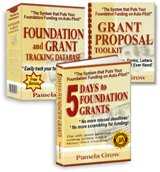 I’ve received a great deal of interest lately from novice and experienced fundraisers about what happens after you receive a rejection letter for your proposal. I have never hesitated to tell people that I’ve received plenty of rejection as a grant writer. What this rejection has done is made me a better, more strategic fundraiser without fear to ask for suggestions or help.
I’ve received a great deal of interest lately from novice and experienced fundraisers about what happens after you receive a rejection letter for your proposal. I have never hesitated to tell people that I’ve received plenty of rejection as a grant writer. What this rejection has done is made me a better, more strategic fundraiser without fear to ask for suggestions or help.
Your grant wasn’t funded, but it doesn’t mean the grant process is over and that all opportunities are lost.
Did you follow the guidelines? Did you make a good case? Did you answer each and every question that the funder asked? Did you spell the names of the contact person correctly? Nothing can be overlooked and the smallest error (yes, even a typo or misspelled name) can lead to rejection.
If you think you did everything correctly and cannot see an obvious reason for your rejection, then it is a good idea to search for more details about your proposal.
It’s fair to say that your rejection letter will offer little or no feedback. Assuming you have a strong relationship with a program officer, you can ask for feedback directly. Government agencies may provide comments or feedback with their rejection, but be careful not to overstep your relationship in this area.
Program officers are busy and may not have time to get too involved with organizations that didn’t receive their foundation’s funding if they don’t have a pre-established relationship or your proposal clearly did not meet the foundation’s criteria. A short phone call is the most appropriate way to reach out for feedback. Make your conversation brief. Ask for suggestions. Ask if they would welcome another proposal from you in the future. Is there a time frame for resubmission? Take notes and thank them for their time. Then, write your thank you letter and get it in the mail!
Thanking a funder even when you didn’t get funded is a critical part of the grant process. Especially if a funder spent time helping you prepare your proposal for submission. A “thank you” can go a long way with anyone. Write a letter thanking the potential funder for their consideration and if you are still a good fit, even include an invitation to visit during an upcoming event at your organization.
Don’t lose sight of a worthy funder just because they didn’t write you a check the first time around. Include them like you would any prospect into your fundraising strategy. Make sure funders receive newsletters, invitations to events, annual reports, etc. Be mindful of the things you mail to them…you don’t want to look like you are wasting resources. However, if it matches the funders interest, make sure they see it.
A good foundation will value your efforts to keep them aware of your organization. Develop a strategy to build your relationship and if their feedback gives you an opportunity to apply again, don’t let the chance pass you by.








